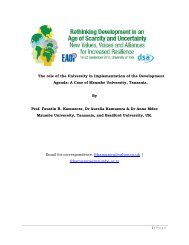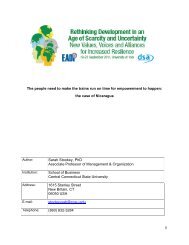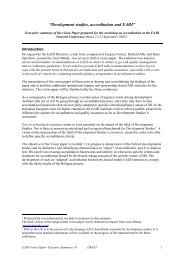Revenue Administration in Sub-Saharan Africa - International Tax ...
Revenue Administration in Sub-Saharan Africa - International Tax ...
Revenue Administration in Sub-Saharan Africa - International Tax ...
You also want an ePaper? Increase the reach of your titles
YUMPU automatically turns print PDFs into web optimized ePapers that Google loves.
Survey results (Table 3)• All revenue bodies, except Botswana, <strong>in</strong>dicated they have powers to <strong>in</strong>terprettax laws and issue b<strong>in</strong>d<strong>in</strong>g or non-b<strong>in</strong>d<strong>in</strong>g public and private rul<strong>in</strong>g of how taxlaws will be <strong>in</strong>terpreted.• All revenue bodies surveyed are vested with powers to remit adm<strong>in</strong>istrativepenalties and charges. However, <strong>in</strong> some countries, maximum limits havebeen set (that is, how much a revenue body can remit without referr<strong>in</strong>g thecase to the MOF). 22• All revenue bodies have powers to design and set <strong>in</strong>ternal structures for taxadm<strong>in</strong>istration.• In terms of the budget, all revenue bodies, except Ben<strong>in</strong>, Burundi, and Senegalhave powers to allocate and reallocate budgets across revenue adm<strong>in</strong>istrationfunctions.• With respect to human resource management, all revenue bodies, exceptBurundi, have leverage to either determ<strong>in</strong>e/set staff numbers orrecruit/dismiss staff.• Four revenue bodies (Ben<strong>in</strong>, Burundi, Senegal and Rwanda) do not have powersto negotiate and set conditions of service for staff.• Most countries have powers to set <strong>in</strong>ternal performance and service deliverystandards.Key observationsThe survey <strong>in</strong>dicates that while the level/degree of autonomy and usage of powers <strong>in</strong>practice may vary from one country to another, the majority of surveyed countrieshave sufficient, and often exercise the delegated powers to perform the revenueadm<strong>in</strong>istration functions. Significantly all revenue bodies (except Botswana) <strong>in</strong>dicatedthat they have powers to make tax law rul<strong>in</strong>gs while most revenue bodies havepowers to remit adm<strong>in</strong>istrative penalties, establish <strong>in</strong>ternal structures, allocate thebudget, hire and fire staff, and set performance standards. In addition, the use ofthese various powers is rated as “often” <strong>in</strong> many countries (see Table 3 for details).Extensive utilization of these available powers, <strong>in</strong>clud<strong>in</strong>g the issuance of timely taxrul<strong>in</strong>gs and implementation of key <strong>in</strong>stitutional reforms, will greatly enhance theeffectiveness and transparency of the tax system. This will improve taxpayers’perceptions of the tax system and promote voluntary compliance.22 Interest and penalty regimes are discussed <strong>in</strong> detail <strong>in</strong> chapter VII.16





